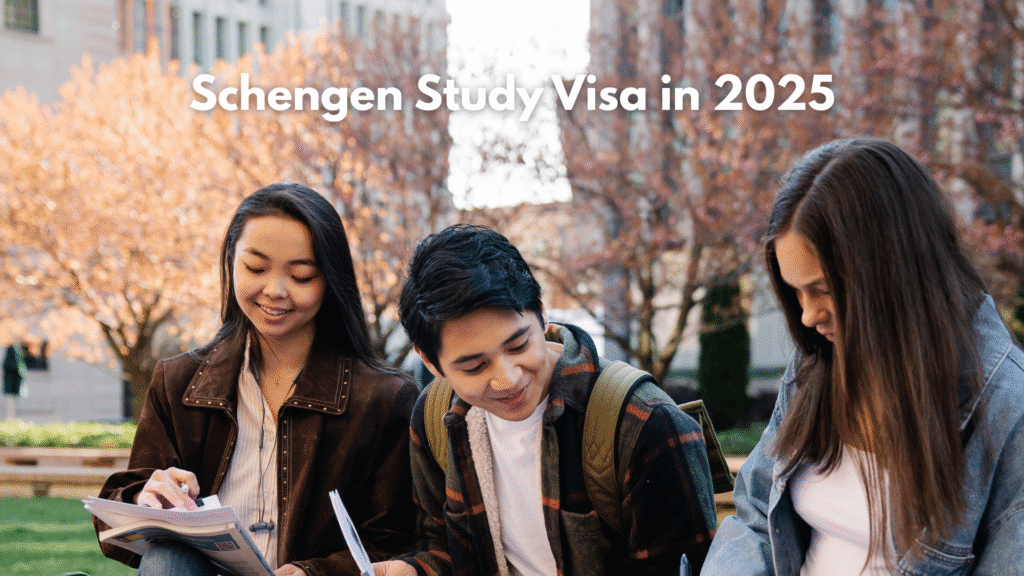Your European Dream: Your Guide to the Schengen Study Visa in 2025
Are you an ambitious student in India with your sights set on a world-class education in Europe? The Schengen Area offers an unparalleled blend of academic excellence, rich cultural experiences, and seamless travel opportunities. As we look towards 2025, understanding the Schengen Study Visa process is crucial for making your dream a reality. Schengen Study Visa in 2025
Table of Contents
At Grades Global Immigration, we’re dedicated to guiding aspiring students like you through every step of this exciting journey. Schengen Study Visa in 2025
Why Study in the Schengen Area?
The Schengen Area, encompassing 29 European countries (with Bulgaria and Romania set to fully join by air and sea in January 2025!), is a magnet for international students for numerous compelling reasons: Schengen Study Visa in 2025
- World-Class Education: Home to some of the oldest and most prestigious universities globally, Europe offers a wide array of high-quality programs across various disciplines, often with lower tuition fees compared to other popular study destinations.
- Cultural Immersion: Immerse yourself in diverse cultures, learn new languages, and experience vibrant student life.
- Travel Opportunities: With a Schengen study visa, you can easily travel across multiple European countries without internal border checks, making weekend getaways and cultural exploration incredibly convenient.
- Career Prospects: Many Schengen countries offer post-study work opportunities, allowing you to gain valuable international work experience.
- Research & Innovation: European institutions are at the forefront of innovation and research, providing excellent opportunities for aspiring academics and researchers.
What is the Schengen Study Visa (Type D)?
For long-term study programs lasting more than 90 days, you will typically need a Type D (Long-Term National Visa). This differs from the short-stay (Type C) Schengen Visa, which is for tourism or short courses. The Type D visa allows you to stay in the specific Schengen country where you’ll be studying and often allows for limited travel within the broader Schengen area. Schengen Study Visa in 2025
Key Considerations for the Schengen Study Visa in 2025
While the core principles of the Schengen Study Visa remain, it’s essential to be aware of potential updates for 2025:
- Digitalization: The EU is moving towards more digitized visa processes with the introduction of the Entry and Exit System (EES) and the European Travel Information and Authorisation System (ETIAS). While ETIAS primarily affects visa-exempt travelers, the general push towards digital applications might streamline some aspects of the Type D visa process. Some countries, like Germany, have already introduced digital application portals for student visas.
- Increased Scrutiny (Germany Example): Germany, for instance, is abolishing the informal visa appeal system (remonstration) from July 1, 2025. This means initial applications need to be flawless. It underscores the importance of submitting a complete and accurate application from the outset.
- Financial Proof: You will need to demonstrate sufficient funds to cover your tuition fees, living expenses, and accommodation for the duration of your stay. The required amount can vary by country, with some expecting €50 to €75 per day.
- Health Insurance: Comprehensive health insurance covering emergency medical care, hospitalization, and repatriation (with significant coverage, often €30,000 or more) is mandatory.
- Accommodation Proof: Evidence of your accommodation arrangements in Europe (e.g., dormitory registration, rental agreement) is crucial.
- Language Proficiency: Depending on your chosen program and country, you may need to provide proof of language proficiency (e.g., IELTS, TOEFL for English-taught programs, or local language proficiency for programs taught in that language). Some countries, like France, are introducing new French language proficiency requirements for multi-year residence permits.
- Processing Time: While the standard processing time is usually 15-30 days, it can extend to 45-60 days in complex cases or during peak periods. Applying well in advance is always advisable, typically 3-6 months before your intended travel date.
Essential Documents You’ll Likely Need:
While specific requirements can vary by country and institution, general documents often include:
- Valid Passport (with at least 3 months’ validity beyond your intended stay)
- Completed Schengen Study Visa Application Form
- Two recent passport-sized photographs
- Travel and Medical Insurance
- Proof of accommodation
- Academic transcripts and previous qualifications
- Motivation Letter/Statement of Purpose
- Proof of visa fee payment
- Flight itinerary (sometimes required)
How Grades Global Immigration Can Help
Navigating the complexities of the Schengen Study Visa can be challenging. At Grades Global Immigration, we offer expert guidance and support to make your application process smooth and stress-free. Our services include:
- Eligibility Assessment: We help you understand the specific requirements based on your chosen country, program, and nationality.
- Document Preparation: Assistance with compiling and organizing all necessary documents to ensure completeness and accuracy.
- Application Guidance: Step-by-step support through the application form and submission process.
- Interview Preparation: Tips and guidance for your visa interview (if required).
- Updates on Policy Changes: Keeping you informed about the latest visa regulations and requirements for 2025.
Don’t let the visa process between you and your European academic dreams!
Contact Grades Global Immigration today for a free consultation:
- Phone: +918800149591
- Email: info@gradesglobal.com
Let us help you embark on an unforgettable educational journey in the heart of Europe!


